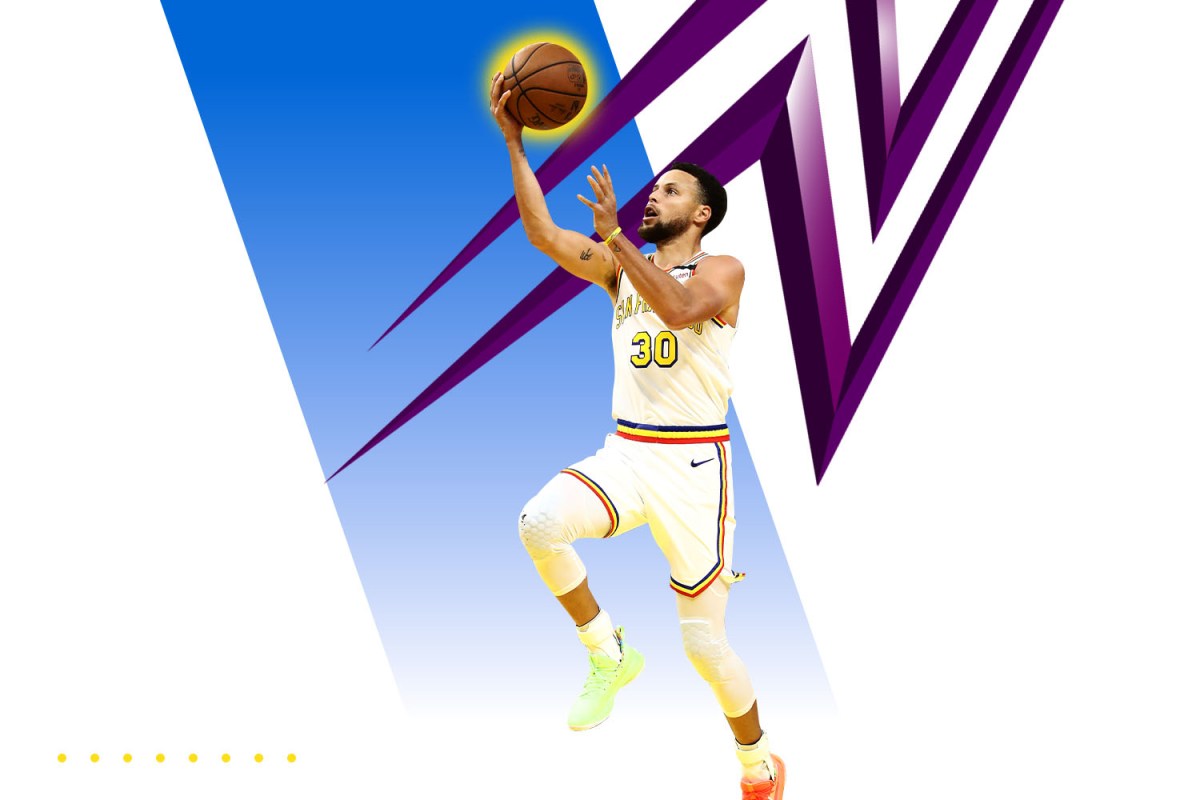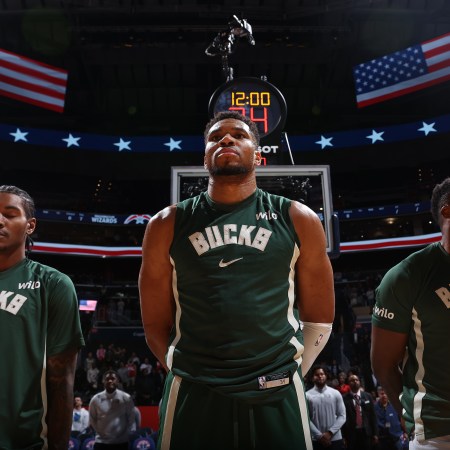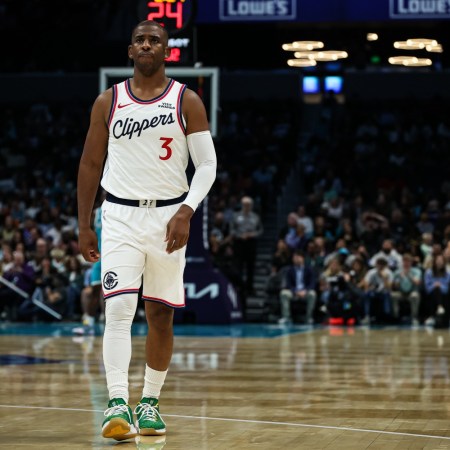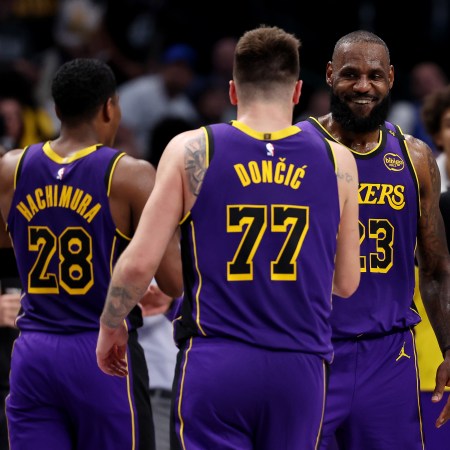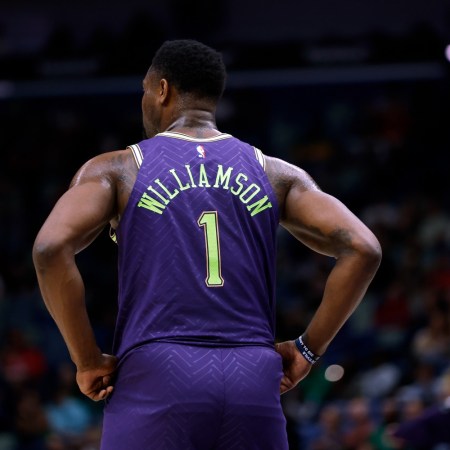For the past six years, the Golden State Warriors were basketball. On the court, Stephen Curry and Klay Thompson reinvented the parameters of a “good” shot and their first championship marked the inflection point when the three-point revolution crossed over into the mainstream. The Warriors also became an inexhaustible fount of intrigue, fueled by Kevin Durant’s free agencies and Draymond Green’s commitment to being Draymond Green. In five years, they racked up three titles; honestly, they probably should’ve swept all of them. As inescapable as they were unbeatable, here was an undeniable dynasty — on hardwood and Tweetdecks alike, all roads led to Oakland.
Now, they start Dragan Bender.
This year, the Warriors are in tatters: Thompson, nursing a torn ACL, has yet to suit up this season; Curry, waiting for his hand to become unbroken, played only four games before sitting out the next 58, though he returned last Thursday against the Toronto Raptors; Draymond Green — not injured in any real sense, just wracked with ennui — has sat out 17 games, and can you blame him? In general, the Warriors have trotted out lineups of guys you don’t know and won’t remember who have been summarily flogged by everybody as they’ve amassed a 14-49 record. The schadenfreude that’s been derived from watching a team whose owner once bragged that they were light years ahead of the rest of the league (also that he joined the Larry O’Brien trophy in carnal embrace) so thoroughly flounder has softened into pity. Realistically, the Warriors without Kevin Durant and Klay Thompson were never going to be as formidable as in years past, but the true scope of their current decline is unprecedented. Perhaps this is a good thing.
Although the Warriors would obviously have preferred not to have been so comprehensively yeeted (yat?) down the standings this season, 2020 represents a chance to recharge as their aging core approaches senescence. Namely, Curry, Thompson and Green have been granted a necessary — if unwelcome — reprieve after a half-decade of consecutive Finals appearances; in the last five years alone, the Warriors have been in over 100 playoff games. For Curry — whose ankles are delicate and precious, like a dragonfly’s wing, this paid time off could be invaluable. While he has largely moved beyond the ankle injuries that threatened to derail his career, Curry has contended with a potpourri of medium-serious injuries for the last few seasons — a strained groin here, a sprained MCL there, a twisted ankle tossed in for good measure. What’s more, if Curry were healthy, he would have to assume the kind of suffocating ball-dominance he aesthetically defies; his high usage rates obscure that his game is predicated on creating space for his teammates, not inhaling it all himself. As thrilling as it may have been to see Curry reinvent himself as an isolation scorer on the fly, it also would have been incredibly taxing and with no promise of success. Instead, Curry cavorted around beaches and informed the public that he is a big-time sex-haver. By avoiding a doomed, Westbrookian crusade for the sixth seed, he preserved himself for battles that he can actually win.
In addition, the Warriors’ spontaneous tank has created a degree of sustainability. Whereas they previously operated with the determined urgency of a Jeopardy contestant who can’t find his buzzer, now they are temporarily freed from the constraints of instant gratification. Saddled by a top-heavy cap sheet, they must now augment their superstar core with players on cheap contracts who might one day develop into contributors. They can’t afford to sign the next Andre Iguodala, so they’ll have to mold their own. Rather than desperately assembling a busyness of competent minimum-salary veterans in a desperate grasp at respectability, the Warriors have foisted new responsibility onto what is essentially their G-League roster. The results? Bad! Quite literally, the worst. But the results are ancillary — it doesn’t matter how a player effects winning this season; what matters is how he’ll fit into a healthy roster in seasons to come.
There are faint tremors of potential. Rookie Eric Paschall, standing just 6’6, is a skosh undersized as a traditional power forward, but he compensates with his stockiness and sense of kineticism. If you examine him from a great distance (and that great distance is obscured by dense fog and you’re also more of a hockey guy), he looks positively Zion-esque: a short, wide forward, chest-bumping into open space around the rim and flinging defenders backwards. Ky Bowman, a rookie point guard, displays a steely confidence that teams look for in backup point guards. Alen Smailagic, yet another rookie, is a center who possesses a startling fluency with the ball in his hands. To be sure, these players, by NBA standards, probably aren’t Seriously Good (Paschall’s gaudy counting stats are largely because of his high usage; Bowman doesn’t shoot nearly well enough; Smailagic has spent most of the year allegedly dominating the G-League, which is the basketball equivalent of definitely having a super hot Canadian girlfriend), but they’ve all more than earned the opportunity to prove next year that they’re Good Enough.
To wit, this empty season has engendered newfound promise. In trading D’Angelo Russell to Minnesota for Andrew Wiggins and the Timberwolves’ 2021 first rounder, the Warriors bet on themselves as a franchise: not only are they good enough to succeed without one of their best players, they’re good enough to unlock the latent goodness in a bad player. In terms of sheer production, Russell dwarfs Wiggins; however, Wiggins hypothetically has considerably more room to grow as a player. Russell is a fringe all-star candidate whose slowness limits his ceiling as a player. In contrast, the only thing preventing Andrew Wiggins from being among the greatest basketball players ever is that Wiggins doesn’t seem to particularly like basketball. Even if Wiggins’s enthusiasm level never reaches beyond that of the average office drone (boss makes a dollar, I make a dime, that’s why I take crappy shots on company time), his sheer athleticism and size should make the Warriors a more dynamic and versatile team.
The Warriors’ real reward for this season, though, is a pile of ping-pong balls on some accountant’s desk in a corporate office that has fluorescent lights so white that they hum — aka the guaranteed top-five pick awarded to the NBA’s worst team. Sadly for them, this year’s draft lacks any can’t-miss prospects; instead, it is populated by oddballs and enigmas. Undoubtedly, there will be prospects who go on to become All Stars, but any selection will rely on a lot of projection and hope. If Zion and Luka were like manna from heaven, the likes of James Wiseman and Lamelo Ball are acquired tastes: they’re tasty morsels from groovy hubs. For the Warriors, this matters a lot less than it might for the NBA’s other losers, because the Warriors already have good players. This pick will not represent a chance at finding a franchise savior, but rather a means to support Curry and Thompson, whether that’s in the form of an infusion of young talent or as a plum asset to trade for a disgruntled star.
And as their hellish season marches towards its end, the Warriors find themselves in a historically enviable situation, ready to enter next season with the nucleus of the winningest team in basketball history, well-rested and with ample motivational material. The San Antonio Spurs are these Warriors’ only historical antecedent: during the 1996-1997 season, they collapsed when David Robinson played only six games and their record was 39 games worse than it was the previous season. That June, they drafted Tim Duncan and haven’t missed the playoffs since. For the Warriors, there’s no era-defining Tim Duncan figure on the horizon, but they can fully realize how to evolve as the era’s defining team. In this wasteland, Golden State somehow fashioned a new cadre of productive bench pieces, added a hugely talented player at a positional need, and out-tanked everybody. They were shown fear in a handful of dust; they were unmoved. When you’re light-years ahead, everywhere is a safe space.
The Charge will help you move better, think clearer and stay in the game longer. Subscribe to our wellness newsletter today.
